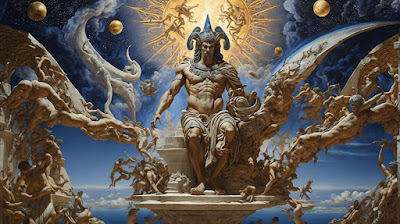Creation Myth From Chaos to Cosmos - Unveiling the Greek Origins
Creation Myth From Chaos to Cosmos - Unveiling the Greek Origins - The story of creation held by the ancient Greeks, who are renowned for their extensive mythology and intellectual endeavors, has stood the test of time. Their conception of the origin and organization of the cosmos was built around this narrative, often known as the "Chaos to Cosmos" account. We'll dig into the enthralling Greek creation myth and examine its historical context as well as the ways in which it still shapes contemporary cosmology and philosophy.
The Primordial Chaos
Greek mythology states that Chaos, a whirling, shapeless emptiness, existed at first. Chaos, which stood for a complete lack of structure and order, was neither observable nor definable. Everything that is familiar to us now evolved from this primordial Chaos.
The Emergence of the First Gods
Two essential deities, Gaia, the Earth, and Eros, the power of attraction and love, arose from the chaos. These celestial entities were the foundational elements of creation. Eros was the irresistible energy that kindled interactions and connections among all things, while Gaia became the mother of all life.
The Universe Takes Form
The universe began to take shape as Gaia gave birth to Uranus (the sky) and Pontus (the sea). The first generation of the Titans, strong and primordial gods who were essential in constructing the cosmos, were created when Uranus and Gaia came together. The Cyclopes and the Hecatonchires, two terrifying and powerful creatures that further advanced the cosmos, were born from this mating.
The Titans and the Olympian Gods
Up until Cronus, one of the Titans, deposed his father, Uranus, with the aid of Gaia, the Titans ruled the cosmos. As Rhea, his sister-wife, and Cronus ruled at that time, the Olympian gods Zeus, Poseidon, Hades, Hera, Demeter, and Hestia were born. Zeus would serve as their commander when these gods finally took charge of the cosmos.
The Creation of Humanity
Humanity was likewise created by the divine in the Greek origin story. Titans Prometheus and his brother Epimetheus were key figures in determining the course of human history. Known for his intellect, Prometheus made people out of clay and stole fire from the gods to give it to mankind as a gift, enlightening it.
Modern Significance
The Greek creation myth had a significant impact on Western philosophy, cosmology, and thinking. It set the stage for comprehending the beginnings of the cosmos and the interaction between chaos and order. The idea that chaos creates the universe is still relevant in a number of disciplines today, including physics, psychology, and literature.
The Big Bang theory supports the scientific notion that the cosmos was created out of a chaotic, formless condition. The path from chaos to self-discovery and enlightenment is a recurring concept in psychology. The hero's journey is a common way for authors and storytellers to illustrate how chaos becomes order.
The Greek creation myth of "Chaos to Cosmos" serves as a timeless narrative that explores the fundamental questions of existence and order. It showcases the power of storytelling to shape our understanding of the universe and ourselves. As we continue to unravel the mysteries of the cosmos and the human condition, the ancient Greeks' wisdom and mythology continue to illuminate our path forward.


Comments
Post a Comment